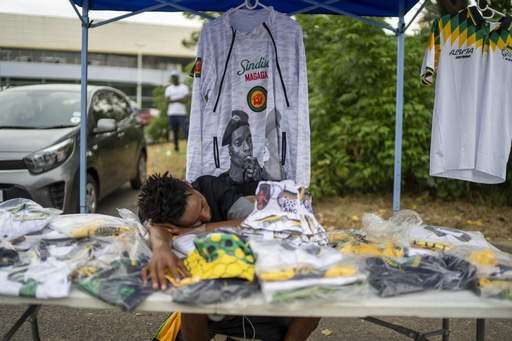CAPE TOWN, South Africa (AP) — Polls suggest South Africa will face a historic turning point in a national election in May as the ruling African National Congress could lose its majority for the first time since coming to power in the country’s first all-race vote at the end of apartheid in 1994.
The ANC has governed Africa’s most advanced economy for all of its 30 years of democracy since the end of white minority rule. But the party of the late Nelson Mandela has seen a gradual decline in support and analysts say this election could be a watershed moment when it slips below 50% of the vote.
That would force the ANC into a coalition — a first for South Africa — to stay in government and keep Cyril Ramaphosa as president. There’s a very small chance the ANC may be out of government completely.
The ANC launched its election manifesto on Saturday.
Here’s what to know about the famous political party and the May 29 vote, which will be closely watched for signs of the direction that one of Africa’s most important countries is heading.
WHAT HAPPENED TO THE ANC
The ANC once commanded 70% of the vote and was almost untouchable in South African politics. It was admired for leading the anti-apartheid movement and freeing South Africa from the system of forced racial segregation.
But that reputation is no longer enough for many as the country of 62 million people faces deep socio-economic problems. The overriding sentiment is that the ANC has failed to significantly improve the lives of millions of South Africa’s poor Black majority over its three-decade rule.
That has been reflected in recent elections. The ANC won 57% of the vote in the last general election in 2019, its worst performance nationally. The biggest wake-up call came in local elections in 2021 when it went below 50%. That meant more South Africans voted for other parties than the ANC in a momentous shift.
THE BIG ISSUES
Poverty and unemployment. South Africa’s official unemployment rate of 32% is the worst in the world and rising. South Africa is rated by the World Bank as the country with the highest wealth inequality, and while it has cities boasting high-rise financial districts, modern airports and some of the world’s best sports stadiums, it also has millions living in shacks and below the poverty line.
The ANC’s reputation has also been tarnished by a stream of corruption allegations, especially under the leadership of former South African President Jacob Zuma from 2009-2018. Rampant graft over that period is estimated to have cost billions of dollars and South Africa held a 4-year inquiry in an attempt to uncover the extent of the corruption.
Most recently, an electricity crisis tied to corruption and mismanagement at the state-run national power supplier has led to nationwide daily rolling blackouts. It has been disastrous for businesses and the mood of South Africans.
THE OTHER MAIN PLAYERS
The main opposition party is the Democratic Alliance. It won 20% of the vote in the last election to the ANC’s 57% and is not expected to be able to challenge the ANC alone this year. The DA has a pre-election coalition agreement with other parties to combine their votes in an attempt to oust the ANC. All of them would have to increase their share considerably for that to happen.
The Economic Freedom Fighters, the third biggest party in Parliament, has risen in popularity under a fiery leader who was expelled from the ANC. It favors some radical far-left policies and is not part of the opposition coalition. If the EFF joined the coalition, that could push the ANC out of government, but the EFF and DA are far apart and as critical of each other as they are of the ANC.
The ANC was jolted last year when Zuma, its former leader, announced the formation of a new party. The uMkhonto we Sizwe (Spear of the Nation) party could draw more votes away from the ANC.
WHAT’S LIKELY TO HAPPEN
Opinion polls predict that South Africa is heading for a coalition government for the first time.
Analysts expect that if the ANC gets less than 50%, it will go into coalition with other smaller parties to stay in government and reelect Ramaphosa for a second term.
South Africa has 14 political parties currently represented in Parliament and more than 300 parties registered nationally. Voters choose political parties and not candidates in national elections. Parties then get seats in Parliament according to their share of the vote, and lawmakers elect the president.
While a coalition government seems likely, that has raised concerns. The country has coalitions at the local government level, but many have failed, leading to more problems in delivering services for frustrated citizens.
___
More AP global elections coverage: https://apnews.com/25-elections-in-2024-that-could-change-the-world



